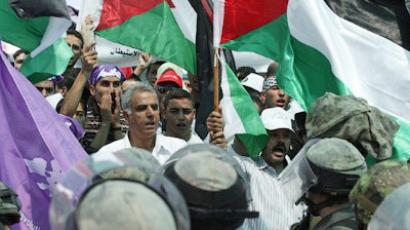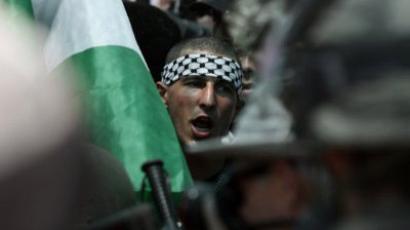Gaza’s children: Defying death under blockade
Israel’s Gaza blockade is a painful daily reality for hundreds of thousands of Palestinian children. In May, the UN said 1,300 youngsters have been killed by Israelis in Gaza since 2000. Many more suffer from the lack of drugs and proper healthcare.
Medicine is extremely expensive and difficult to bring into Gaza. Donations recently collected in Russia for Gaza’s children were used to purchase nine priority medicines. It took three more months to get permission from Egypt to transport the medicine to the region, to have all tests and paperwork done – this was how RT’s Nadezhda Kevorkova got to Gaza and learned about the blockade in the dry language of doctors.We were still at the Rafah checkpoint when doctors called and said the vehicle with medicines must rush to the storage facility so that they could receive the medicine and get it to hospitals in time. Next day, we met those who had been given hope by the Russian Solidarity Foundation.
I’m sharing three of the most optimistic stories among those we witnessed in Gaza.Abderrahman is 10. He was seven-and-a-half when a missile hit a house he was passing on his way to school. His face was burned by the flames.His family doesn’t belong to HAMAS, it hasn’t taken part in war. Their son was just on his way to school. Israel never offered any compensation for his medical care. When he was released from the Sawlef hospital, the boy’s father took all the mirrors out of their house.The father said that the boy retreated into himself, and started drawing. He draws pictures of tanks and aircraft. The family managed to get permission to get him treated in the best Israeli clinic, the Hadassah Medical Center. The father took his son as far as Ramallah – he wasn’t allowed to go further, he was told the boy would have to travel through Israeli territory on his own.‘We waited for three months to get permission to go. It took us three days to get there. We went to the clinic for one day, and were told to go back again. The trip and the medical treatment were very expensive, $5,000. I could only go as far as Ramallah. There were some good people there, they would pick up my son, take him to the hospital, wait there for five hours and bring him back. So far he hasn’t had any surgery. He’s undergone seven courses of American injections, medicine that’s supposed to smooth his skin out. There isn’t such medicine in Gaza", says Sawlef.
In spite of everything, this is a happy story, as the boy wasn’t killed or blinded. He’s no longer embarrassed to come out and meet strangers; he’s back at school, and he wants to become an artist. The 2009 Israeli military operation alone left more than 500 heavily disabled in Gaza; in total, there are more than 12 thousand. On the morning of 5 January 2009, 15-year-old Hassan Shafig al Attar was also on his way to school when a missile dropped by an unmanned aircraft caught up with him. Now he’s paralyzed from the waist down. He cannot control his bladder, besides a host of other problems. He had to miss three years of school. Now he’s caught up on his studies, and he’s a 12th-grade student. But he still needs surgery. An Israeli hospital agreed to provide him with paid care, and the Gaza Foundation for the Disabled began raising money. But the Israeli security service declined his request. He never received any compensation from Israel – neither for his injury, nor for being denied medical treatment. In Gaza, he was given a special scooter for disabled people, but this isn’t at all Hassan needed, after all he’d been through. Nonetheless, he still plans to enter the General administration and management department at the Islamic University of Gaza.I asked him how other children treat him at school. Hassan smiled for the first time during our talk:"They think of me as a hero."
Ibtisam Umm Mohammad, a happy mother of six girls and one boy, was a healthy-looking young woman when I first met her a year-and-a-half ago. Back then, she had just finished writing a book about the casualties of the Israeli assault on Gaza in 2009. Defying the still raging air strikes, Ibtisam would go around local neighborhoods, paying a visit to every bereaved family, collecting photographs and writing the bios of every slaughtered Palestinian – babies and school pupils, teenagers and old people, adolescent girls and mothers. Then Ibtisam fell sick, and doctors told her the ailment was caused by inhaling the vapors from chemical ordnance used by the Israelis, as well as being exposed to radiation from Israeli projectiles. She was diagnosed with nasopharyngeal cancer and had to undergo therapy. Ibtisam was lucky enough to be treated in a Turkish hospital, and her prognosis looks promising. She is currently using her sick leave to learn English.
A pharmaceutical disaster
Ophthalmologist Dr. Mohammed Al Kashif, Director General for International Cooperation and one of the senior experts of the UN Mission to Gaza, says the enclave’s healthcare situation reached a critical point by June 2011:“We could not go on providing therapy and performing surgery. Our patients were dying in our arms, because the doctors had nothing to treat them with. We had to tend to about 150 disabled paralyzed people. So we appealed to the public for help, and listed everything we were short of on the internet. Some 460 pharmaceutical drugs were in short supply, and another 150 were completely lacking. The Gaza Strip needed roughly 900 types of pharmaceuticals, dressing and other expendables, 200 of which were not stocked by local hospitals at all. We have experienced surgeons on our team, but we cannot make up for the shortage of drugs without public support.”
Good will doctors
The Gaza Strip is currently being saved by volunteer medics from across the globe, from Norway to Greece to Muslim countries. International media are reluctant to report on this fact. A team of French medics was recently denied entry into Gaza through the Rafah checkpoint, but they still got in through a network of underground tunnels. According to Dr. Al Kashif, volunteer medics come to Gaza to perform surgery and share their expertise and best practices with local colleagues. Most of them do it free of charge as a means of expressing their solidarity with the Palestinians. Some of the volunteers are renowned champions of the profession: a surgeon from the United Arab Emirates recently did surgery on 20 deaf patients while mentoring younger medics in the process. I met Gaza’s Healthcare Minister Dr. Basem Naeem the morning after an Israeli airstrike claimed nine lives and left another 100 people injured. “We have lost more than 2,500 people from airstrikes since the end of the war, and many thousands have been wounded. The blockade is taking its toll on the Palestinians. Five medics were killed during the war of 2008-2009. Surgeons would have to perform operations amid mutilated bodies and blood, with severed body parts scattered around the room. We were short of patient places, so sometimes they would do surgery down on the floor. My brother, who is a surgeon, was busy operating when he got the news of his own son having been killed. He completed the operation before he went to receive his son’s body,” the minister tells me. One of the handicaps imposed by the blockade, Dr. Naeem explains, is medics’ inability to leave the Gaza Strip, which prevents them from being certified for promotion. Some of the local hospitals have managed to make up for this by installing video conference equipment, which has enabled 190 doctors to pass long-distance tests and become certified. The Arab Medical Union has provided similar capabilities for surgery rooms, for surgeons to be able to consult their colleagues while in the middle of an operation.Three thousand two hundred medics currently work in Gaza, of whom over 500 were trained and educated in former Soviet republics.
Nadezhda Kevorkova, RT














